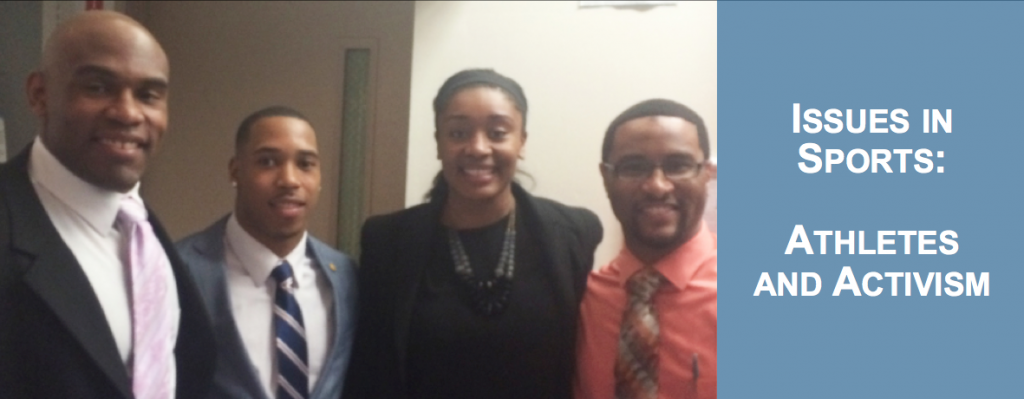Issues in Sports: Athletes and Activism
Round table talk explores athletes’ place as role models, activists
Article written by Kimberly Armstrong, re-published courtesy of The Daily Campus
Student athletes and sports management experts met Thursday morning in the CLAS building to explore athletes’ places as role models and activists.
The round table talk, “Issues in Sports: Athletes and Activism,” was the third and final lecture of Wura Olusekun’s special project for the sports management master’s program. Olusekun said the goal of the panel was to challenge the perception that athletes should remain neutral in public and to encourage conversations about race at the University of Connecticut.
“These conversations are extremely important and they give us the opportunity to see athletes as multidimensional,” Olusekun said during her introduction.
There’s a difference between being a role model and an activist, though, assistant professor of sports management Joseph Cooper said during the panel. While other people can choose athletes as their role models, he explained, athletes have to choose to be activists.
“Similar to the notion that sports don’t operate in a vacuum, we as individuals don’t exist in a vacuum. Our multiple identities are always present,” Cooper said. “I just think taking the time to educate yourself on these issues is important.”
Cooper, whose work involves studying stereotypes about players’ abilities based on race and other factors, said athletes must be empowered to take a stand on issues they care about.
While today’s players have brought attention to the Black Lives Matter movement by wearing black on the court and even boycotting games, one of the best known instances of athlete activism occurred at the 1968 Olympics when track and field stars Tommie Smith and John Carlos supported the Black Power movement by raising their fists in solidarity on the podium.
Morgan Tuck, forward for the UConn women’s basketball team and an 8th-semester business management major, said she thinks it’s important for players to be informed and to experience college life beyond the court. Tuck, for example, joined a sorority and does community service in her free time.
“I think as athletes we kind of live in a bubble, so some of these social justice issues we don’t really experience,” Tuck said. “As athletes we do have a voice and we should use it.”
Tuck said she began to recognize her power to push change as a UConn athlete when a fan asked her to record a video congratulating her and her girlfriend on their recent engagement. While the young women’s parents weren’t entirely comfortable with same sex marriage at the start, Tuck said the video helped smooth things over for the lovestruck Huskies.
Reaching out to the community can also help student athletes figure out who they are off the field, said Joshua Marriner, a former UConn football player currently competing on the track team. Marriner, an 8th-semester communications major, does service projects with his fraternity in addition to working with minority athletes at Project Uplift.
“They were able to actually build me as a man and teach me that I have other things going for myself besides athletics,” Marriner said. “It took me branching out to realize that I need to grow as more than just an athlete because one day athletics is going to be over for me and who am I going to be after that?”
Marriner said it’s also important to be a positive example for the next generation of kids who look up to the players they see on TV.
“Even if it’s not on the field, they need to know that they can make it in other ways in their life,” Marriner said.
Marquise Vann, a former UConn football player and 8th-semester urban and community studies major, said he views being a good role model as an obligation.
“The way I think about it is without someone being there to support me there is no way I would be at the University of Connecticut,” said Vann, who credits his grandmother with pushing him to succeed.
